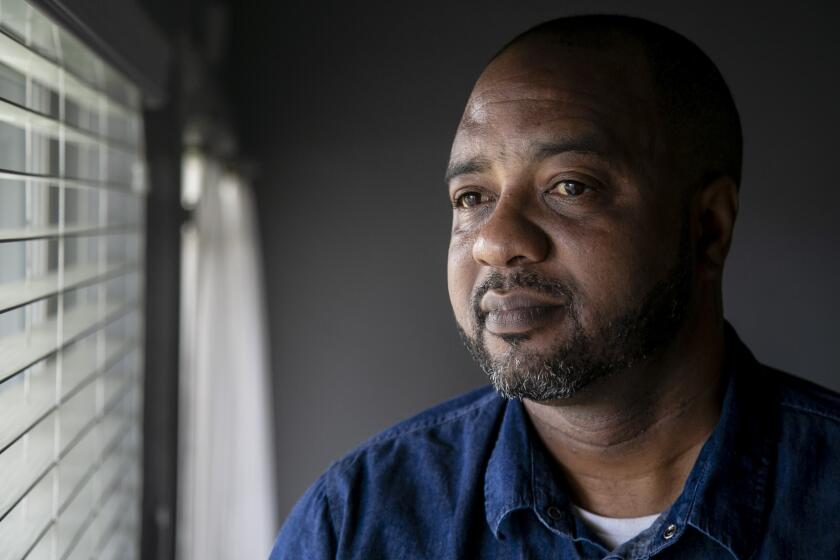O.C. deputy who beat Black man is on administrative leave in a separate investigation
An Orange County sheriff’s deputy who was caught on video beating a Black man has been placed on administrative leave amid an unrelated investigation and is being criminally investigated, sheriff’s spokeswoman Carrie Braun said.
Braun would not disclose the matter of the internal investigation into Deputy Michael Devitt.
“Due to an ongoing internal criminal investigation, we are not commenting further at this time,” Braun said in an email.
Dashcam footage showing Devitt beating Mohamed Sayem made national headlines when it surfaced in 2018. Authorities said Sayem was intoxicated and sleeping in his car in a parking lot in Stanton when a group of deputies confronted him in mid-August of that year.
According to court documents and the widely viewed video, Devitt “yanked” Sayem from the car and punched him repeatedly in the face until he was taken to the ground.
The district attorney’s office also recently dismissed four cases Devitt was involved in and will dismiss a felony charge against Sayem for resisting arrest, according to a motion filed last week by Assistant Public Defender Scott Sanders, who is representing Sayem.
Sayem will now face misdemeanor charges on suspicion of resisting arrest and public intoxication.
“Mohamed Sayem should not have faced felony charges for three years, so there is obvious relief in the dismissal,” Sanders said through email. “At the same time, it is brutal that Mr. Sayem continues as a criminal defendant while Deputy Devitt and Deputy Lewis [another deputy involved in Sayem’s arrest], the latter having turned off his supervisor’s audio at the scene and previously filed more than 40 false reports, have not faced a single charge.”
Sanders’ motion also takes umbrage with how the district attorney’s office took six months to disclose Devitt’s misconduct. Sanders received the information on the investigation into Devitt after filing a motion requesting it in July. However, the information was placed under a protective order, so he can’t discuss it.

An O.C. sheriff’s deputy was caught on video repeatedly punching Mohamed Sayem, a Black man, in 2018.
In that earlier motion, Sanders detailed how the deputies involved in Sayem’s arrest have faced investigations for prior misconduct, including tasing a suspect in the back of a patrol vehicle and filing dozens of false police reports. Two of the deputies were involved in two of the highest-profile scandals to hit the Sheriff’s Department in recent years.
“I could not imagine a more infected group of officers at the scene,” Sanders said in an interview at the time.
One of the deputies involved in the arrest, Blake Blaney, was the first sworn member of the Sheriff’s Department to illegally access inmate calls to their attorneys in 2015. He didn’t report this or face any punishment for the misconduct.
Another involved deputy, Brant Lewis, was internally and criminally investigated for writing false reports and failing to book evidence on time, Sanders’ motion detailed. Lewis was a key subject in the highly publicized evidence-mishandling scandal, where several deputies failed to file evidence or filed it late.
Lewis was never charged for his actions and still works in Stanton.
As cases are tossed or rejected by prosecutors, the reliability of police accounts increasingly is being challenged amid a push for criminal justice reform.
Sanders’ new motion also takes issue with how the district attorney’s office has handled the evidence-mishandling scandal.
Between February 2016 and February 2018, the Sheriff’s Department conducted an audit of thousands of reports and found that more than 1,100 deputies booked evidence late and 414 deputies booked evidence 30 or more days late.
Yet, the district attorney’s office has added only 16 deputies to its Brady list, which is a record of officers who have engaged in misconduct.
The office also recently announced that 15 others will be considered. Sanders sees the additions as insubstantial considering the high number of deputies who have been found to take part in the scandal.
“You’ve got 30 people, after all this, on this list?” Sanders said.
D.A. spokeswoman Kimberly Edds said the office has responded to the scandal in a number of ways, including removing DNA samples from its database in connection with any cases where DNA was not properly booked.
“Sixteen deputies have been added to the district attorney’s Brady Notification System in connection with booking evidence late or not at all as a result of criminal referrals by the Sheriff’s Department,” Edds said in an emailed statement. “As a direct result of the district attorney demanding the audit be expanded, an additional 15 deputies have or will be referred to the district attorney’s office for Brady review and potential criminal filings and the OCDA Conviction Integrity Unit has also referred several deputies for Brady review in connection with evidence booking.”
In his motion, Sanders also criticized the process the district attorney’s office uses to add deputies to the Brady list. According to the motion, the district attorney’s office relies on the Sheriff’s Department to refer deputies for Brady list review.
“This is nonsensical,” Sanders said in an interview. “The Sheriff’s is the agency who did the misconduct. ... Why would you turn to the Sheriff’s to lead you on the path to who should be on the Brady list?”
The next hearing in Sayem’s case is slated for Wednesday.
Brazil writes for Times Community News.
More to Read
Sign up for Essential California
The most important California stories and recommendations in your inbox every morning.
You may occasionally receive promotional content from the Los Angeles Times.












